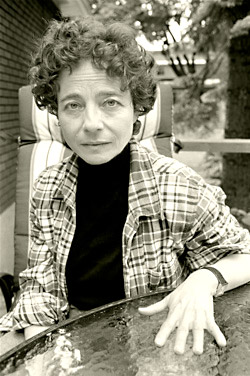

Four poems:
A Little Song in Franglish
From Flower of Youth, The Pasolini Poems
Quietus
War Smells Like Shit
This piece is about 4 printed pages long.
It is copyright © Mary di Michele and Jacket magazine 2007.
A Little Song in Franglish
Ma belle, it’s Sunday and the
bells of St. Joseph clamor,
a branch is mon coeur
covered in verglas.
From a pavilion in the jardins
botaniques I hear Cohen singing
as when he was still living
ici in the sixties.
Ma belle, I adore
this icy French city.
From Flower of Youth, The Pasolini Poems,
*
She combed my hair, put a flower
behind my ear, Pina, my companion, my soul
Pina who must know my every thought
who must leave nothing
hidden between us,
except what she must not know, except
what I could tell
no one. She and I were lying
in the sacred solitude of the fields,
she dying of desire and I dying
of boredom, dreaming
only of Bruno, his Turkish trousers,
his white silk socks.
*
The new green in spring is acid yellow,
the first birds sing their medley of chirps and whistles,
the mulberry trees open their leaves like hands
to receive the rain of sunlight. There was no sin
if there was no Bruno!
I heard human voices––I heard words in the singing
of the birds when he came, he came
naked to the waist, he led while I followed,
close as his noon shadow, into a hidden corner.
The dew had dried but the stones were
still luminous as if wet; where we
lay together the earth trembled
with the passing trains.
Quietus
From “The Flower and the Book” (Flower of Youth manuscript)
(Campo Santo, Casarsa, Italia)
(Pier Paolo Pasolini 1922-75)
Row upon row, there’s no green, no grass, just dust and gravel paths around the graves. I walk among them looking for him. Photos of the dead mark most of the graves––their faces, their presence absence. They seem to look out expectantly from the frames. Not forgotten, neither can they forget. But then there are the graves falling into ruin, the photos, faded and cracked, the images now faint shades of sepia. Are those men and women more than dead, now that even their names are nearly erased? Is the young man whose wreath is still fresh from the funeral, the flowers moist with dew or tears, still alive in comparison?
I cannot find him. I try again and retrace my steps, walking back up and down the rows under a sun heading into noon’s high heat, my search taking on an edge. He, no not he, I don’t really believe that, not the man, but it, the grave, is here. How could I miss it? Must I go back to the hotel without finding it?
When I finally give up and go to leave, he’s there on the right side as you exit the cemetery. There are two graves, his mother’s beside him,
two flat white marble and matching
stones. A tree grows out of the gravel,
too small to shade them.
War Smells Like Shit
From After Pasolini
Black the hours when stars glitter in the obsidian
sky above while on the horizon, the rising moon spills
milky light. I don’t know if we’ll ever see
each other again. A day has passed; my youth has passed.
All day I sat among the dry vineyards, in my body
the wasteland of boredom. Everything here smells
of endings, of shit and firing squads.
I haunted the unplowed fields, picked a primrose
here and there, breathed in the green.
The snows of mount Cavallo seemed to float in the azure.
Alone I wandered the fields, walking, walking, walking the
endlessly empty fields
Everything smells of gunpowder and shit but the earth’s
a bitch flowering anyway from all that shit––
in blossoms blue and yellow, in tender buds on the alders.
I want to spit as far as the farthest mountains on the borders
of my country, into the sea hidden behind them, I want to spit
into the faces of these villagers, these Italians, these Christians.
Everything smells of firing squads and dirty feet––
(What keeps me tied to this earth? I must stink myself.)
I don’t know if we’ll ever see each other again.

Mary di Michele
Mary di Michele was born in Lanciano, Italy, in 1949 and immigrated to Canada with her family in 1955. She is a currently a full professor in the English Department of Concordia University in Montreal, where she teaches in the creative writing program. Her publications include several novels and eight books of poetry. She has won numerous awards including the Air Canada Writing Award and first prize for poetry in the CBC literary competition.
The Internet address of this page is http://jacketmagazine.com/34/c-dimichele.shtml